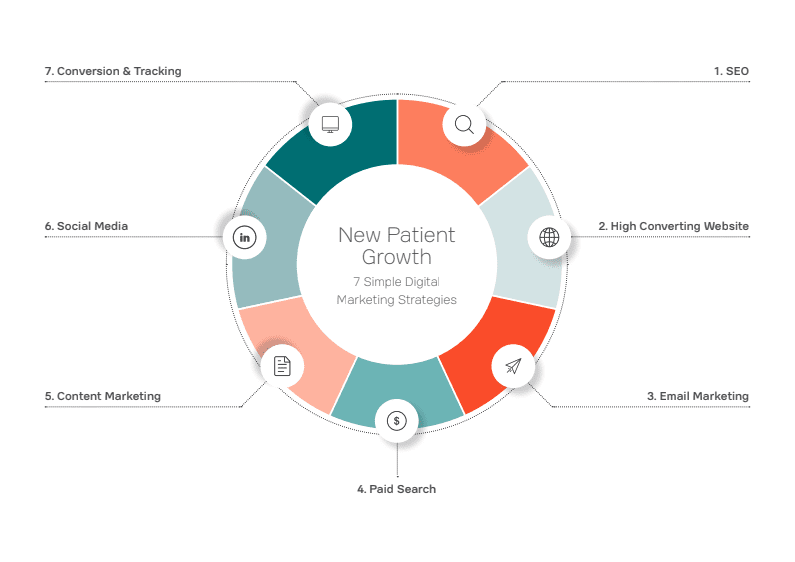Surgery is a hugely varied field with patients drawn from across the age spectrum. Some surgeries are done from urgent medical necessity, some are done after a patient weighs up various possible treatment options and some are done by choice to enhance a person’s appearance.
Whatever the reason for it, surgery is always high stakes to a patient. As an experienced surgeon, you no doubt feel quite at home in the operating theatre but your patients certainly don’t. Surgery is a big deal to them, incurring considerable financial, emotional and physical costs. They spend time deliberating whether to have the op then more time deciding who should do it.
Then there’s your GP audience. GPs are rightly called the gatekeepers of the health system. When they think a patient might need surgery, it’s their job to refer them to the right surgeon. You want them to pick you.
As a surgeon, that means you need to market yourself well to patients and referral networks to ensure that more people pick you.
Which market activities work best, though? Should you plaster your face across a few billboards, deliver business cards and flyers to local practices or advertise in the local paper?
You could do that. But we’d recommend you focus on digital marketing strategies. Here’s why.
What is digital marketing?
Digital marketing is a broad term that covers any kind of marketing accessed from an app or the internet. It includes advertising on search engines, social media, websites or email.
Why is digital marketing superior to conventional offline marketing?
Three reasons:
- It’s highly targeted so drives new patients
- It’s easy to track meaning you can measure success
- It’s focused on ROI.
Digital marketing is highly targeted
If you think about all the ads you’ve seen recently, the odds are that you saw most of them when scrolling through your newsfeed on your phone.
And those ads you saw didn’t appear on your screen accidentally; they were deliberately served to you based on your demographic profile or interests. They’re highly targeted at people most likely to respond to them.
That’s quite different to traditional marketing. The billboards you drive past on the freeway probably don’t interest about 98% of drivers. They aim at a very wide audience in the hope of attracting a handful of new customers.
Digital marketing is easy to track
There’s no way of knowing how many people pick up your flyer or read your newspaper ad.
Digital marketing, though, provides a wealth of information about how many people engaged with your marketing campaign. You can see:
- How many people saw your ad on Facebook, Google, LinkedIn or Instagram
- How many times your ad was clicked
- How many times a certain webpage was viewed
- How many people made a phone call from your page or submitted a form.
You can do things with that data too. You can use it to contact those people again through direct emails or retargeted ads, giving you an opportunity to build on the interest they’ve already shown in your business.
Digital marketing focuses on return on investment (ROI)
It’s easy to see whether or not you’re getting your money’s worth from digital marketing. You know how much you’ve spent on your marketing, you can see how many new patients you gained and you know their lifetime worth to your business.

For each aspect of your marketing campaign, you can use certain metrics to measure your ROI. That includes:
- Email metrics like the rates of click-throughs, bounces, unsubscribes, leads acquired and conversions
- Social media metrics like the rates of engagement, clicks, click-throughs, new followers and conversions
- Landing page metrics like traffic, unique and returning visitors, page views, time spent on the page and conversions
- Blog metrics like time on the page, unique and returning visitors and conversions.
7 digital marketing strategies for surgeons
So, you can see the benefits of digital marketing for surgeons, but where do you start? Here are 7 steps to help you grow your practice through effective digital marketing.
1. SEO & local SEO
Search engine optimisation (SEO) is the art and science of being found online, the slow but immensely rewarding process of making Google fall in love with your brand.
Some quick SEO wins you can implement include:
- Setting up a Google Business Profile account and answering every question accurately
- Deciding which services you want to rank for (e.g. knee surgery, Adelaide) and organising your site so it’s easy to find the right page
- Creating a clear contact page that includes your location, phone number and email.
The last one is important for local SEO. Grab your phone now and type in ‘GP near me’. First, you’ll see some paid ad listings. Then you’ll see a map of your local area and 3 nearby GP clinics. That’s local SEO in action.
You don’t even need the ‘near me’ bit. If you type in ‘dentist’, Google will still assume your search intent is to find a local dentist and will show you nearby options.
2. High-converting websites
Your website should make it easy for your target audience to find the information they’re after and easy to take the next step, such as downloading a resource or booking an appointment.
As a surgeon, your audience is both patients and referring doctors. So, it makes sense to have a ‘Refer a patient’ and ‘Book an appointment’ displayed prominently.
Make sure people can do all the necessary next steps such as attaching a referral letter or booking. This may mean you need to invest in some new software for your practice but it’s worth it. Your audience wants to act there and then – don’t risk losing their interest by replacing the ability to act with the ability to request a callback.
3. Tracking & conversions
We’ve already discussed how digital marketing enables you to track who’s clicked on your ads and see which people have converted (booked).
You don’t automatically get that treasure trove of information though. You need to set up Google Analytics and Google Tag Manager to track new patients.
4. Paid search
Paid search refers to Google Ads and Facebook Ads. These are paid ads that appear at the top of Google’s search results or which show up on the right people’s feeds when they scroll through Facebook.
Paid search is highly targeted. You define your audience carefully, choosing attributes that reflect your ideal client’s age, gender, location and interests.
If you’re a bariatric surgeon, for example, you’re looking for clients who are struggling with their weight. Your audience targeting might include people who:
- Are middle-aged
- Demonstrate a desire to lose weight such as following diet or exercise pages
- Have a high level of disposable income – proxy indicators might include liking business class travel, luxury holiday destinations or expensive stores.
Paid search can deliver a good return on investment because you’re only charged when people click on your ad. You can also set a daily budget to keep the costs predictable.
5. Content marketing
You’re an expert in your field. When patients are told they need surgery, they’re anxious and hungry for information to help them make a decision or prepare for what lies ahead. 
Content marketing builds your authority and credibility by sharing your knowledge on topics relevant to your audience.
The content might be blogs, videos or downloadable resources. Ideally, provide a mix of different forms of content to suit different people. When writing, aim for a conversational style using plain English and explain any surgical terms.
Subtly, your audience is also checking you out. Do you seem approachable or arrogant? Have you anticipated and addressed their questions, showing that you understand their needs? Do they finish reading and feel like they’d be in good hands with you? That’s what you’re aiming for.
6. Social media marketing
About 80% of Aussies are active social media users, spending about 1 hour and 45 minutes a day scrolling through Facebook, Instagram and YouTube.
Social media marketing makes your audience’s preoccupation with social media work in your favour.
You can get started by:
- Creating a Facebook page or Instagram business profile for your practice. Unlike personal pages, business pages are visible to everyone and can be crawled by search engines.
- Regularly posting content that’s relevant to your audience like questions to ask your surgeon, tips on preparing for surgery or what rehab involves. Your content can be a simple post or a post that links to a longer blog or video. This is known as organic content and reaches the people who’ve already liked or followed your page.
- Investing in some pay per click ads or boosted posts to reach a wider audience.
- Responding to any feedback with a simple ‘Glad you found it useful’ or similar message.
- Staying on the right side of AHPRA – you’re responsible for the content of your own social media page so need to delete any testimonials that patients may post here.
- Providing information about your practice such as changes to your consulting times, bios of staff members or photos of your new premises.
7. Email marketing
Sitting on your computer is a goldmine of email addresses. Your patient database contains contact details for people you’ve engaged with before. You may have further emails from some of the digital marketing you’ve been doing if you’ve asked people to enter their email to download a useful resource, for example.
Now it’s time to use those email addresses. If you can segment your database then do so, e.g. into people who have or have not yet had surgery. Then you can tailor your messages to each group.
You might plan a monthly email that provides links to your recent blogs or brief health advice on a relevant topic.
The goal is to keep this group of interested people engaged, gradually warming them up so that, when they decide it’s time for surgery, they want you.
There are various programs like Mailchimp which you can use to make your emails look professional and appealing, and can even show you who opened your messages or clicked on your links (providing even more useful data that you can use to refine your messaging).
–
Digital marketing for surgeons is a key driver of practice & new patient growth. Hopefully, you can start implementing these strategies, monitoring your metrics and gain a good return on your marketing investment by attracting new patients to your surgical practice.





